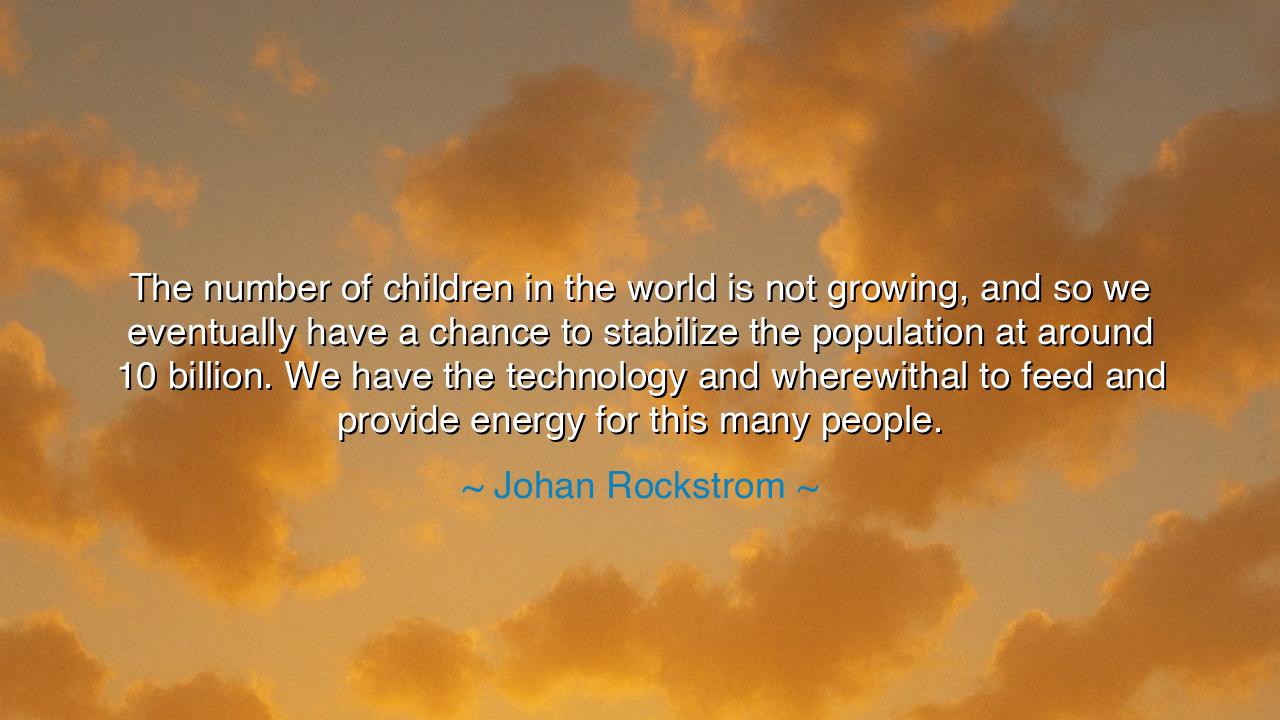
The number of children in the world is not growing, and so we
The number of children in the world is not growing, and so we eventually have a chance to stabilize the population at around 10 billion. We have the technology and wherewithal to feed and provide energy for this many people.






In the annals of time, humanity has always faced the great question: how can we ensure the sustainability of life on this Earth as we grow in numbers and in ambition? The ancients understood the delicate balance between creation and destruction, between abundance and scarcity. Today, as we stand on the precipice of a new age, Johan Rockström speaks with the wisdom of the ages, offering a vision of hope and possibility when he declares: "The number of children in the world is not growing, and so we eventually have a chance to stabilize the population at around 10 billion. We have the technology and wherewithal to feed and provide energy for this many people." These words are not just a statement on population growth, but a clarion call to recognize the power and responsibility we hold to shape the future of our world.
For centuries, the fear of overpopulation has loomed large in the hearts and minds of those who sought to understand the fate of mankind. The ancient civilizations, from the Greeks to the Romans, wrestled with the questions of sustainability, often turning to their gods for guidance, wondering whether the Earth could sustain the growing demands of a swelling population. Yet, as Rockström wisely points out, we now stand in an era where technology, once a mere dream, is a powerful force that can shape the future of humanity. The growth of our numbers is no longer an inevitable force of nature, but a challenge we can manage, a problem we are now capable of solving with wisdom and innovation.
In the stories of the ancients, we see how human ingenuity rose to meet the needs of a growing world. Consider the example of Cyrus the Great, the founder of the Persian Empire, who faced the challenge of governing an empire vast in land and rich in diversity. He recognized the need for a system of resource distribution, ensuring that the wealth of the empire was shared and that all could thrive. His vision was not only one of conquest but of sustainability. Likewise, Rockström's words echo this ancient wisdom, reminding us that we now have the power to manage the resources of our world, to ensure that each person, no matter how many there are, can live in harmony with the Earth.
The lesson of Rockström's vision is both urgent and hopeful. He reminds us that the number of children in the world is not growing at the rate it once did, offering us a rare opportunity to stabilize our population. This shift, coupled with the advancements in technology, presents an unprecedented moment in human history—a moment when we have the tools to ensure that the Earth can sustain the 10 billion souls we are destined to become. We have the knowledge to feed, to nourish, and to provide energy for all, ensuring that no one is left behind. This is not a dream, but a possibility that lies within our grasp.
In the days of ancient Egypt, when the Nile would flood and the people relied on its bounty to grow their crops, they had no such technology, no such ability to control the forces of nature. They relied on the gods, on the cycles of the seasons, and on the goodwill of the land. Yet even then, there were moments when they would seek balance, when they would call upon the wisdom of their priests to understand how to stabilize their future. Today, we no longer need to rely on the whims of nature. We have innovations in agriculture, in renewable energy, in water management that allow us to control the course of our destiny. But with these tools comes a great responsibility—a responsibility to use them wisely, to ensure that we share our resources and care for our Earth with the reverence it deserves.
So, as we stand on the threshold of this new era, the question before us is not whether we can sustain a world of 10 billion, but whether we will choose to rise to the occasion. Rockström's words offer a hopeful answer. We have the tools, the knowledge, and the opportunity to shape a world where each person can live in dignity, where sustainability is not just an ideal but a reality. But it will require all of us to act, to innovate, and to lead with compassion and foresight.
Let us take this wisdom to heart. Let us remember the ancients, who understood the delicate balance between growth and sustainability, and let us strive to create a future where we do not just survive, but thrive. The chance to stabilize our population and ensure the sustainability of the Earth is before us. Let us not squander it, but rather, let us use the power of our technology, our knowledge, and our unity to ensure that the Earth can continue to nourish and sustain all of humanity for generations to come. We are not the inheritors of this world; we are its stewards, and it is our sacred duty to care for it.






AAdministratorAdministrator
Welcome, honored guests. Please leave a comment, we will respond soon